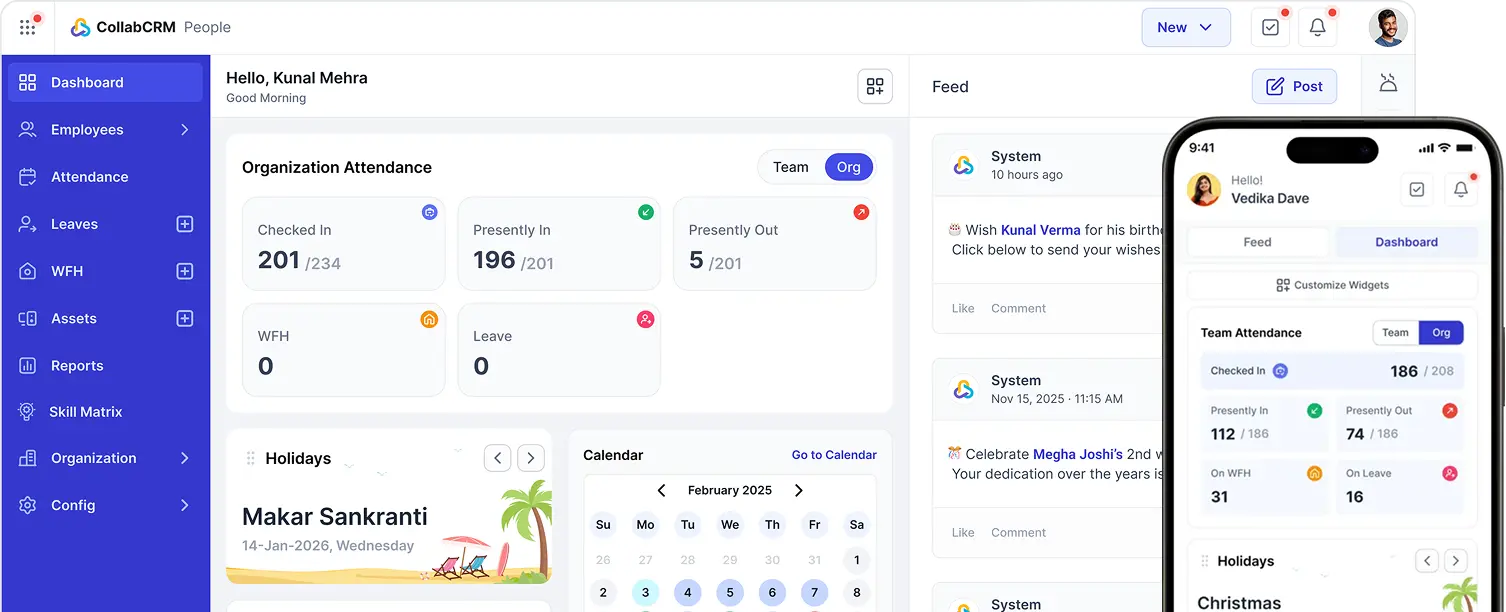Inefficiency, redundancy, improper decision-making, maximized operational risks, and a lack of collaboration may be the result when you lack a business operating system (BOS) in your company. While you invite plenty of hurdles when not using one, if you’ve a business operating system, it keeps risks at bay, opening doors to immense productivity and profitability.
Right from comprehensive data access, data-driven decision-making, excellent finance management & reporting to robust data security and business profitability, a BOS ensures organizations receive optimized operations and benefits. These are just a few; however, there are many benefits and, thereby, reasons why you need a business operating system.
This blog navigates you through an intensive guide on why you need a business operating system, its key elements, benefits, and how to know when your business needs a BOS.
What Is a Business Operating System?
A business operating system (BOS), or a workflow management software, is an integrated and centralized system designed to help businesses manage multiple operations with just a single interface. It improves efficiency by combining various tasks and ensuring task automation, seamless communication, project management, and workflow optimization.
BOS allows teams to collaborate, manage resources, track progress, and maintain visibility across functions. For example, in IT companies, the functions would be product development, IT service management, or end-to-end business management. This system allows businesses to automate manual processes, minimize errors, and maximize productivity, ensuring smoother execution, enhanced scalability, and optimized profitability.
Key Elements of a Business Operating System
- Standard Operating Procedures (SOPs): Accurately documented processes for recurring tasks that ensure consistency and efficiency in how members across teams perform their tasks.
- Technology & Tools: Tools for communication, customer relationship management (CRM), project management, accounting, and many more.
- Centralized Workflow Management: A completely centralized system to handle various business operations with ease and convenience.
- Performance Metrics & KPIs: Key performance indicators that allow intensive measurement of the overall business operations and progress tracking to achieve goals.
- Organizational Structure & Roles: Clearly define who is responsible for what accountability, fostering effective decision-making.
- Excellent Financial Systems: Excellent accounting, budgeting, and financial reporting systems, allowing effective management of cash flow, expenses, and profits.
- Communication and Collaboration: Tools that ensure seamless communication and smooth collaboration within the organization, whether it’s just an internal team meeting or customer interaction.
- Frequent Improvement & Feedback Loops: Customer feedback loop, highly efficient mechanisms, allow consistent customer feedback, frequent assessment and tweaking, and thereby boosting process and profitability.
Why Do You Need a Business Operating System?
There are many benefits, extensive data access, efficient project management system, enhanced workflow, reduced risks, cost-effectiveness, and improved business profitability are the benefits of a business operating system, to name a few! Mentioned below is a detailed description of the benefits of the BOS that you would like to know about:
Comprehensive Data Access
A Business Operating System (BOS) provides access to comprehensive data by centralizing business information on one platform. It allows real-time data visibility across departments, allowing informed decision-making.
With a customizable dashboard and reporting tools, the system provides convenient access to key metrics, boosting transparency, collaboration, and strategic alignment in processes in the organization.
Efficient Project Management and Workflow Automation
BOS systems help teams manage all the client campaigns and internal projects. It enables project managers to set up workflows that automatically assign tasks and keep track of deadlines and progress of various campaigns.
When a task is completed, the system automatically triggers the next step, increasing productivity, transparency, and coordination among departments, reducing missed deadlines, and increasing efficiency.
Seamless Human Resources and Employee Onboarding
New startups with frequent new hires employ work management software to streamline HR processes. The software triggers an onboarding checklist when a new employee is hired, which includes everything from completing paperwork to setting up email accounts.
HR professionals, with a business operating system, can seamlessly store and track documents such as contracts, benefit information, and compliance training in a centralized platform. It reduces the time needed to conduct administrative tasks and ramps up for new hires, enhancing and improving employee onboarding.
Accurate Sales Pipeline & CRM Management
Organizations using a work management system can easily manage the complete sales lifecycle. It tracks leads from the very beginning when they enter the pipeline and assigns them to the relevant sales representatives based on predefined criteria like industry, company size, or previous interactions.
Automated email sequences, follow-up reminders, and task assignments make sure no lead falls through the cracks. The BOS ensures effective collaboration inside the sales team, higher conversion rates, and data-driven insights into sales performance.
Excellent Finance Management & Reporting
Businesses use workflow management software to conduct financial operations accurately. These systems automate invoicing and expense tracking, making sure all the transactions are well-categorized and reconciled accurately. The system generates monthly financial reports, providing key insights relating to the cash flow, profit margins, and tax liabilities.
These features and offerings of a business operation system enhance accuracy in financial oversight and decision-making, thereby minimizing the risks of financial errors and missed tax deadlines.
Optimized Operations & Excellent Decision-Making
A business operating system (BOS) centralizes and automates tasks, accelerates workflow, and enhances team collaboration. The system thereby improves decision-making backed by real-time data insights, clear performance metrics, and insights.
Optimized operation and excellent decision-making ensure increased efficiency, mitigated errors, and excellent alignment of strategies throughout business operations.
Reduced Risks by Robust Security
A business operating system incorporates robust security features such as encryption, access control, and multi-factor authentication, thereby reducing risks. It safeguards sensitive business data, restricts unauthorized access, and ensures complete compliance with industry regulations.
By centralizing security protocols, BOS helps businesses reduce risks of data breaches and operational vulnerabilities, ensuring robust security.
Cost-Effectiveness and Business Profitability
A BOS automates tasks, minimizes manual efforts, and streamlines processes, thereby lessening overall operational costs. It improves decision-making, enhances efficiency, lessens errors, allows better resource allocation, drives scalability, and accelerates workflow, ultimately skyrocketing the revenue potential.
How to Know If Your Company Needs a Business Operating System
Since a business operating system brings along plenty of benefits to the table, it’s a bit tough to determine when you need one for your organization. If you relate to the following circumstances, it means you need a BOS:
A business operating system is needed if:
- Teams often misunderstand goals, deadlines, or responsibilities.
- The experience at your company is chaotic.
- No standardized workflows, leading to inconsistent results.
- You are frequently remarking about the lack of accountability among your team members.
- Information is siloed in multiple apps, making decision-making slow.
- You are experiencing falling profits with increasing sales.
- You’re experiencing ‘got-a-minute’ interruptions throughout your day.
- There are many communication breakdowns during the day.
- Projects lack visibility, and KPIs aren’t monitored in real time.
- Errors occur regularly because there’s no central process to prevent them.
- Time is wasted due to a lack of structure and clear agendas.
- Approvals and choices get stuck with a few people instead of flowing smoothly.
- Staff feel overwhelmed due to unclear priorities and duplicated efforts.
- Clients get different levels of service depending on who handles them.
Wrapping Up!
When there’s no business operating system (BOS), businesses are likely to risk inefficient operations, slow growth, poor decision-making, and operational chaos. In today’s competitive business landscape, organizations need cohesiveness, helping them to stay agile, limit risks, and maximize profitability.
CollabCRM is among the best business operating systems for startups and enterprises, allowing businesses to manage a wide array of tasks efficiently. It supports businesses with excellent team collaboration, workflow automation, project management, and task management, ensuring a seamless business operation.
So now that the guide has explored many aspects, it showcases the reasons why you need a business operating system. Now that you’ve become aware of it, implement a robust business operation software system and take your business to the next level!
FAQs on Business Operation System
A business operating system (BOS) provides a structured framework to operate a company smoothly. The purpose of a BOS is to improve efficiency, consistency, and scalability by streamlining processes, simplifying, clarifying roles, and aligning teams towards shared goals. The system acts as a company’s playbook, defining how operations take place.
A business operating system is a holistic framework that integrates processes, tools, and performance metrics in the organization. While standard business software often serves a single function, a BOS aligns all functions under one unified system for strategic and operational efficiency.
A BOS creates clarity, consistency, and accountability within an organization. It ensures teams work toward common goals, improves decision-making through real-time data, and streamlines operations to boost productivity and scalability.
A BOS centralizes workflows, automates repetitive tasks, standardizes procedures, and gives leadership visibility into performance. Each of these reduce inefficiencies and speed up decision-making.
A business operating system is beneficial for businesses of all sizes. For small businesses, it brings structure and scalability; for large enterprises, it enhances cross-department alignment and operational control.
It standardizes processes, sets shared KPIs, and provides centralized dashboards so all teams work from the same information and objectives, reducing silos and miscommunication.






